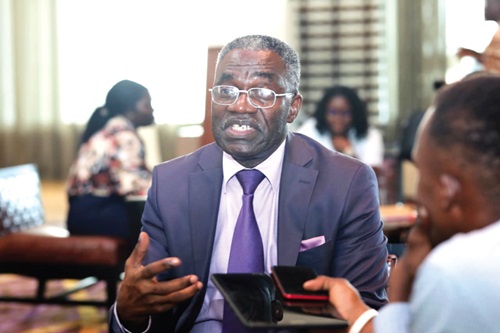
Scientists seek solutions to cashew cultivation challenges
Research scientists from 11 African countries have converged on Accra for a cashew research dialogue as part of the sixth Council of Ministers' Conference of the Consultative International Cashew Council (CICC).
Advertisement
The conference, jointly sponsored by the GIZ, Proper Cashew, Pro-Cashew and Ghana Incentive-Based Risk-Sharing System for Agricultural (GIRSAL), will see the participants presenting research findings that can address challenges confronting cashew cultivation in their respective countries.
Some of the challenges the scientists are seeking to address include yield per hectare, diseases, pest control, mitigating climate change effects, among others. Countries that form the CICC are Ghana, Senegal, Togo, Mali, Benin, Burkina Faso, Cameroon, Nigeria, Cote d'Ivoire, Guinea-Bissau, Guinea.
Research findings
Briefing journalists at the presentation of scientific research findings in Accra, the Scientific Director for the Scientific Research Commission of the CICC, Dr Paul Adu-Gyamfi, said the conference offered the scientists a platform to share ideas.
"This conference offers us the opportunity not only to share ideas, but also to bring out the current research findings as well as to shape the production of cashew to make it the crop of the future," he told journalists.
Dr Adu-Gyamfi said one major research work that concerned the scientists was to undertake research on non-chemical-based pests control methods to ensure safety of the consumption of cashew.
He explained that the direction had become compelling because the use of conventional insecticides had posed lots of health concerns and a threat on the international market.
"Again, we are looking at ways of handling cashew when they are ready for harvesting," the research scientist added, explaining that depending on the post-harvest management procedures, cashew could lead to the accumulation of toxic substances in the kernel.
"This will be unsafe for consumption,” he said, stressing that the conference had presentations that would address the post-harvest of issues of cashew.
Expectations
“I expect that there will be new generative ideas that can solve the problem of low yield among cashew varieties across producing countries. “At the end of the day, I expect innovative ideas that will solve the issue of pest and diseases, providing safe consumption of cashew,” Dr Adu-Gyamfi told journalists.
He was optimistic that at the end of the conference, the scientists would agree with the standard procedures of handling cashew to limit contamination in kernels and nuts. Speaking on the research findings and their relevance, the Chief Executive Officer (CEO) of the Tree Crops Development Authority (TCDA), William Quaittoo, explained that annually, the researchers met to present their findings and other best practices for member countries to adopt.
He said over the years, the CICC conference had contributed to the acquisition of new knowledge on activities concerning cashew, and also create a platform for finding antidotes to controlling diseases as well as issues dealing with post-harvest and marketing.
Cashew production
Touching on the state of the crop in the country, Mr Quaittoo said he was happy with the rate at which cashew was developing in the country. Citing the production levels, he said over the last three years, there had been a significant increase, quoting that from 2021, Ghana produced 170,000 tonnes to 230,000 tonnes in 2023.
“So, as the regulator of tree crops in the country, I am very happy with the rate at which cashew production is increasing,” Mr Quaittoo said.



